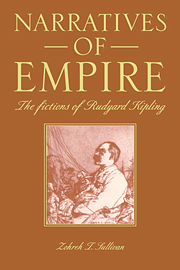5 - The bridge builders
Published online by Cambridge University Press: 18 September 2009
Summary
In his introduction to The Portable Kipling, Irving Howe identifies what he calls the “specter” that haunted Kipling's imagination as “breakdown of authority: at first the authority of public life, but in his later work that of private life as well.” Kipling's attitudes towards authority were as divided as his attitudes towards India and himself: it is at once something he desired and fled. The frame of narratorial authority in his early stories is always disturbed by and implicated in the tale it chooses to tell. The authority he relies on to guide his daily life is fractured in his art, where he recognizes that it has no essence outside of the social groups that construct hierarchy and recreate received images of imperial power. Through his narrators Kipling acknowledges the power of the various institutions to know but not to control the behavior of their subjects. But he also articulates the power of “stalkying” – the authority to defy the system through superior and crafty individualism – the “heroism” of a T. E. Lawrence or an Oliver North who can transcend the laws of ordinary morality and function beyond the control of external policing powers. As Isabel Quigley and others have observed, Stalky is produced by imperialism: “ the very adjective ‘imperial’ applies to him because to function at all such a man needs devoted followers, childlike admirers to whom he seems godlike, unquestionably right” (Stalky & Co. p. xxvi).
- Type
- Chapter
- Information
- Narratives of EmpireThe Fictions of Rudyard Kipling, pp. 114 - 144Publisher: Cambridge University PressPrint publication year: 1993



